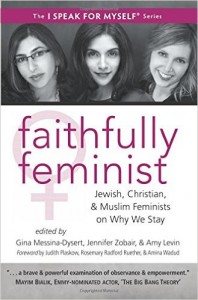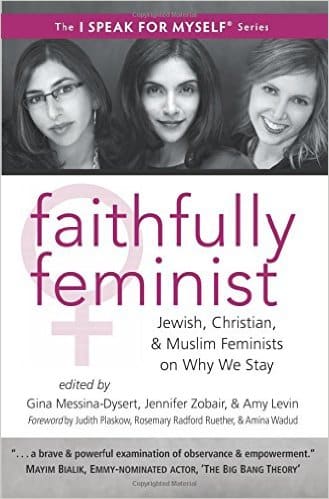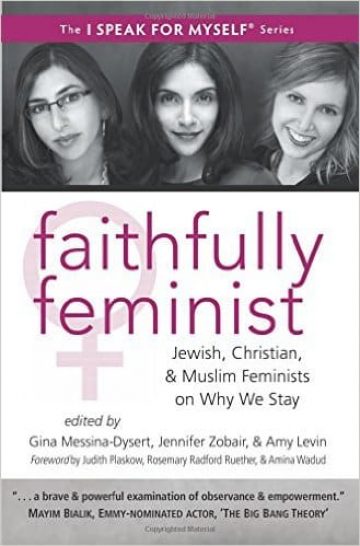 Nancy Ross is a professor of art history at Dixie State University. She is interested in contemporary Mormon feminism and is currently writing a memoir about reading the Book of Mormon at different stages of her life.
Nancy Ross is a professor of art history at Dixie State University. She is interested in contemporary Mormon feminism and is currently writing a memoir about reading the Book of Mormon at different stages of her life.
Faithfully Feminist: Jewish, Christian, & Muslim Feminists on Why We Stay. Edited by Gina Messina-Dysert, Jennifer Zobair, & Amy Levin. Forward by Judith Plaskow, Rosemary Radford Ruether, & Amina Wadud.
I hate to gush, but if I could nominate this book to be elevated to scripture, I would. I ordered it because my friend and fellow Mofem Caroline Kline had an essay in it. I moonlight as a sociologist of religion and felt it was directly relevant to my areas of research. I’ve also read Gina Messina-Dysert’s work before, including the recent excellent book that she co-edited with Rosemary Radford Ruether titled Feminism and Religion in the 21st Century: Technology, Dialogue, and Expanding Borders. Students of Mormon feminism should also know that that book has chapters by Caroline Kline and Margaret Toscano.
I thought I would be interested in Faithfully Feminist, but I expected that my engagement would be largely academic. I looked forward to analyzing and comparing the personal essays of 45 Christian, Jewish, and Muslim feminists. I did not expect that I would be moved by the stories of these women, so deeply moved. I have heard Joanna Brooks speak about the power of telling our stories, but I have never been quite sure of what that power really was. I suspected that it was something about identity formation and framing our narratives in empowering ways, but reading Faithfully Feminist showed me that the nature of that power is in sharing the way that we wrestle with faith and community. Reading so many stories of this wrestling felt validating.
Though I read the book several months ago, there are several essays that stand out in my mind. The first is by Dasi Fruchter and is titled “Leading from Here.” Fruchter talks about the ways in which she and her mother did what they could to lead from the women’s balcony at her synagogue. Tradition prevented her from leading from the bimah with the men, where she longed to be, but she lead the women with her singing voice in the balcony.
Caroline Kline wrote about her participation in the two Ordain Women Priesthood Session actions. A conservative woman in her ward affirmed Caroline’s desire to stand in line again and noted that it is important to do what we think is right. I was involved in planning and carrying out these actions and it is both joyful and painful to hear others discuss them: joy because I also felt that it was right and pain because they were moments of confrontation and transformation, which are always painful.
Rachel Lieberman saw gender everywhere in the practice of her Jewish faith. In her essay titled “Blessed Are You, Who Has Made Me a Woman,” she wrote about the prayer that Orthodox Jewish men recite, where they thank God for not making them women. Liebermann defied this ritual by thanking God in prayer for making her a woman.
Nia Malika Dixon and Amanda Quraishi showed me the elements of Muslim faith that were appealing enough to make feminists convert. They wrote about how they integrated their old and new faiths to create meaningful experiences for themselves.
The book affirmed religious feminists’ tensions, rejections, creations of new ritual, and negotiations of religion and belief from the margins. As I read, I felt that these stories of struggle were sacred to me, that the book was filled with the narratives of imperfect-yet-holy women struggling against religious structures that didn’t want them, but they still believed. These are uncomfortable truths that many of us live with, but they are made more bearable by hearing that others experience the same.
This is a part of the Exponent Book Review Series and Cyber Monday Giveaway. By making a thoughtful comment on this post, subscribing to the Exponent, or making a donation to Exponent II by sending a PayPal donation to [email protected], you will be entered into a drawing to win one of many books being reviewed! Check the intro post for information and terms. Entries accepted until the 5th of December 2015.







19 Responses
Thanks for this terrific book review, Nancy! I’m so glad that you liked the book. My friend Gina poured her heart into putting this book together. She’ll be thrilled to know that it resonated with you so deeply.
This will be going on my Christmas list. Thanks for the review!!
I didn’t realize there were 45 essays! What a treasure trove! Thank you for your review, Nancy.
I bought this as a Christmas gift to myself, but am thinking I might break it out sooner to help invite the spirit into my heart.
Thank you so very much for sharing your thoughts on this book with us, Nancy!!
This book is perfect for inviting the Spirit! It was such a fulfilling read.
This one has been on my ‘want!’ list for a while as I’m an interfaith junkie and feminist. Thank you, Nancy, for the wonderful review!
Thank you for this beautiful and thoughtful review, Nancy. I have begun (but not quite finished) reading this book. The parts I have read have made me feel and feel and cry and cry. It is so beautiful, and so healing. The struggle and telling of that struggle is sacred to me, too.
I’ve been reading this and have been surprised by the variety presented, especially in Islam and Judaism. I had no idea that there were sects of these two religions so open to egalitarianism. I also found it interesting to read Rabia Saundry’s essay after listening to the podcast Serial.
This has been one I’ve hoped to read for a long time. Thanks for this review, Nancy!
Thanks for this review, Nancy. I hadn’t heard of this book before, but it’s definitely going on my “to read” list now!
Thanks for this review. I like how other faith traditions were represented besides just Christian ones.
This book sounds like a treasure. Wouldn’t it be wonderful if we could teach from it in Relief Society? Both traditional and feminist women could grow in understanding of what it means to be a woman of faith.
AMEN.
I am eager to read this book and to learn from women of other faith traditions who are committed to carving out a place for themselves in their religious communities.
Hi Nancy! I will have to add this book to my list. It sounds like just what I need after this latest policy change.
I need to get this book. I attended a conference where the editors and writers of the forward sat on two separate panels, and then women of faith had break-out sessions about their faith. It was incredibly affirming and moving. There is definitely power in sharing our stories. Thanks for the review.
I have really wanted to read this book a lot. Thanks for the review.
[…] Faithfully Feminist: Jewish, Christian, and Muslim Feminists on Why We Stay. $12.20 Gina Messina-Dysert, Jennifer Zobair, and Amy Levin (editors). This book features one of the Exponent blog’s co-founders on the cover, as well as in one brief essay in the book. (It is so beautiful and made me cry and cry.) I adore Nancy’s review about the whole book, here. […]
[…] Faithfully Feminist (ebook) by Gina Messina-Dysert, Jennifer Zobair, Amy Levin. Here’s the review on our blog. […]